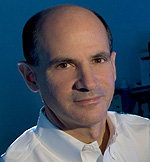5 Questions: Rando on resetting the ‘aging clock,’ cell by cell

Thomas Rando
Advances in the study of stem cells have fueled hopes that someday, via regenerative medicine, doctors could restore aging people’s hearts, livers, brains and other organs and tissues to a more youthful state. A key to reaching this goal — to be able to provide stem cells that will differentiate into other types of cells a patient needs — appears to lie in understanding “epigenetics,” which involves chemical marks stapled onto DNA and its surrounding protein husk by specialized enzyme complexes inside a cell’s nucleus. These markings produce long-lasting changes in genes’ activity levels within the cell — locking genes into an “on” or “off” position. Epigenetic processes enable cells to remain true to type (a neuron, for instance, never suddenly morphs into a fat cell) even though all our cells, regardless of type, share the same genetic code. But epigenetic processes also appear to play a critical role in reducing cells’ vitality as they age.
